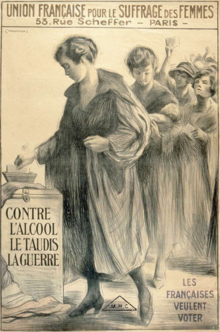French Union for Women's Suffrage
| French: Union française pour le suffrage des femmes | |

1909 poster: "French women want to vote - against alcohol, slums and war"
|
|
| Abbreviation | UFSF |
|---|---|
| Formation | 1909 |
| Extinction | 1945 |
| Purpose | Obtain the franchise for women |
| Headquarters | Paris |
|
Region
|
France |
|
Official language
|
French |
|
Key people
|
Cécile Brunschwicg |
| Affiliations | International Woman Suffrage Alliance |
The French Union for Women's Suffrage (UFSF: French: Union française pour le suffrage des femmes) was a French feminist organization formed in 1909 that fought for the right of women to vote, which was eventually granted in 1945. The Union took a moderate approach, advocating staged introduction of suffrage starting with local elections, and working with male allies in the Chamber of Deputies.
The UFSF was founded by a group of feminists who had attended a national congress of French feminists in Paris in 1908. Most of them were from bourgeois or intellectual backgrounds. The leaders were Jane Misme (1865–1935), editor of La Française, and Jeanne Schmahl (1846–1915). The UFSF provided a less militant and more widely acceptable alternative to the Suffrage des femmes organization of Hubertine Auclert (1848–1914). The sole objective, as published in La Française early in 1909, was to obtain women's suffrage through legal approaches. The founding meeting of 300 women was held in February 1909. Cécile Brunschvicg (1877–1946) was made secretary-general. She was the wife of the philosopher Léon Brunschvicg.Eliska Vincent accepted the position of honorary vice-president. The UFSF was formally recognized by the International Woman Suffrage Alliance (IWFA) congress in London in April 1909 as representing the French suffrage movement.
The UFSF expanded quickly as Brunschwicg toured the provinces lecturing on feminism, and feminist school teachers organized local chapters.Sarah Monod, the dignified president of the National Council of French Women, became a member.Jeanne Mélin, a member of the French Section of the Workers' International, joined the UFSF.Louise Bodin, later to become prominent in the French Communist Party, was among the founders in March 1913 of a local UFSF group in Ille-et-Vilaine. By 1914 there were 12,000 members in 75 of the French departments. The UFSF strategy included collaboration with parliamentary representatives who supported women's suffrage such as Ferdinand Buisson, and a gradual process of enfranchisement that would start with votes in local elections.
...
Wikipedia
